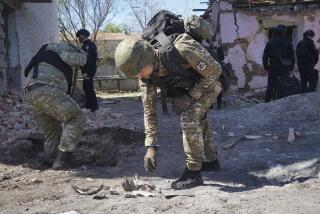Where terrorists hide
An ancient principle of warfare bears contemplating anew: No counterinsurgency campaign has ever succeeded when the insurgents had easy access to sanctuaries in which to hide, regroup, rearm and plan new attacks.
Last week’s news underscored the problem. In Afghanistan, Taliban fighters, who enjoy sanctuary in Pakistan, blew up a fourth telecommunications tower as part of a campaign to silence cellphone service at night. In Pakistan, missiles of unknown origin smashed into a Taliban compound in what appeared to be the second unacknowledged U.S. Predator strike into that country this year. Turkey struck at Kurdish rebel enclaves over the border in northern Iraq. From Gaza, Hamas pelted Israeli towns with increasingly longer-ranged missiles. And Colombia, fed up with attacks by guerrillas from jungle camps in Ecuador, staged a cross-border raid and was denounced across Latin America for violating Ecuadorean sovereignty.
Wiping out terrorist sanctuaries after 9/11 wasn’t supposed to be so difficult -- except that it always has been. The Bush administration assumed that swift and massive U.S. military might, followed by democracy and massive infusions of money for development, would sweep the terrorists into the dustbin of history. It hasn’t happened anywhere.
One person who understood the sanctuary problem in his bones was former Deputy Secretary of State Richard Armitage, who learned the lessons of counterinsurgency in Vietnam, Cambodia and Laos. In 2001, Armitage went to Pakistan to negotiate with President Pervez Musharraf to ensure that Taliban fighters routed by the U.S. from Afghanistan wouldn’t come right back. As the world now knows, Musharraf either couldn’t or wouldn’t deliver, the U.S. military turned its attention to Iraq, and the unresolved problem of the Taliban sanctuaries is now a topic in this year’s presidential campaign.
No matter what the candidates tell voters, the options for the next U.S. president (and the leaders of Israel and Turkey and Colombia) are all bad. Option 1: Brave international condemnation and mount a cross-border blitzkrieg. But that’s expensive, destabilizing, alliance-corroding and probably only a temporary fix. Option 2: Try yet again to seek political accommodation with the insurgents, offering promises of autonomy, development projects and bribes. But that risks the stigma of being caught negotiating with terrorists and, because terrorists rarely keep their word, leaving the peacemaker humiliated as well as empty-handed. Option 3: Keep killing and bribing as many insurgents as possible and hope they wear out first.
In Afghanistan, the United States has been pursuing Option 1, while hoping the Afghans and Pakistanis will have better luck with Options 2 and 3. But the Bush administration now seems uninterested in ideology and open to anything that works. While the U.S. appears to be continuing surreptitious strikes inside Pakistan, 3,200 additional Marines are deploying to reinforce British troops waging the counterinsurgency in Afghanistan’s Helmand province, increasing the pressure on the Taliban from both sides of the border. Meanwhile, there is talk of trying to divide and conquer the insurgents by splitting the “tribalist” Taliban -- who are primarily Pashtun nationalists interested in defending their traditional way of life against foreign incursion, their ethnic rivals and the central government in Kabul -- from the “Al Qaeda” Taliban, foreign and home-grown ideological jihadists with whom political coexistence is impossible.
Identifying and separating the two groups won’t be easy, if it is possible at all. Both groups have used terror, making it difficult to demonize some while negotiating peace with others. And Musharraf has already tried cutting a deal with tribal leaders, who promptly reneged. Still, some U.S. officials believe that the new Pakistani leadership might succeed in persuading some tribal leaders to stop fighting the Americans and to fight Al Qaeda instead -- just as the Sunni Awakening movement in Iraq turned anti-American insurgents against Al Qaeda there. Given the paucity of other options, it seems churlish not to try offering the populations of the sanctuaries the one thing they can’t win by war: peace.
More to Read
Start your day right
Sign up for Essential California for news, features and recommendations from the L.A. Times and beyond in your inbox six days a week.
You may occasionally receive promotional content from the Los Angeles Times.






